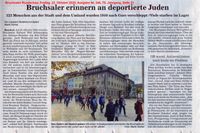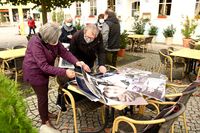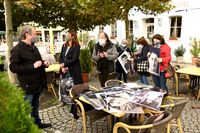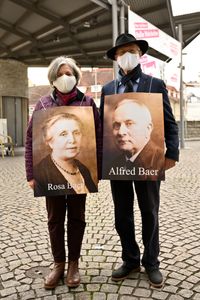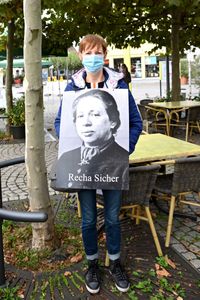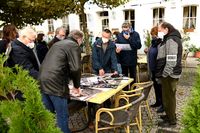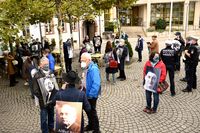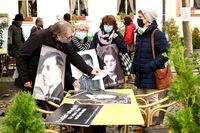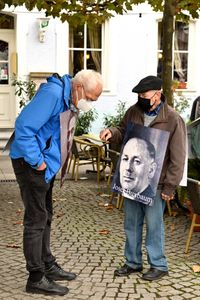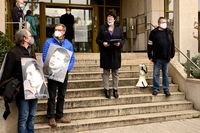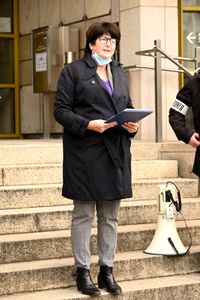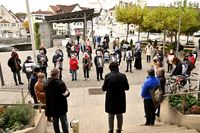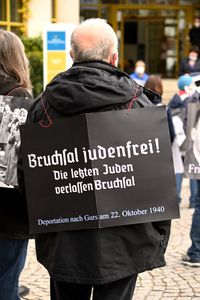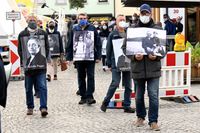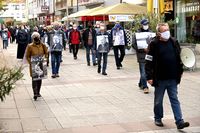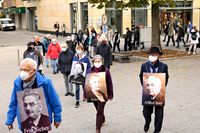Gurs Silence March in Bruchsal on 22 October 2020
On the occasion of the 80th anniversary of the expulsion of Jews from Baden and the Saarpfalz to the concentration camp Gurs in southern France
the association (Förderverein) Haus der Geschichte der Juden in Baden,
the association (Förderverein) Lernort Bergfried-Bruchsal "Freedom - Civil Rights - Democracy" and
the Friedensinitiative (peace initiative) Bruchsal
on 22 October 2020 a GURS silent march through Bruchsal.
This silent march began at 10:00 a.m. at Otto-Oppenheimer-Platz and led across the pedestrian zone, Kaiserstrasse and Friedrichstrasse to the train station area. At the beginning and at the end of the march commemorative ceremonies were held. Lord Mayor Cornelia Petzold-Schick gave a commemorative speech.
Members of the three organizations carried photos of victims of this inhuman action by the Nazi regime in memory of the victims of this deportation. This is to commemorate the people whose children and grandchildren could be members of our urban society today. The deported and mostly murdered people should be given names and a face again. Because of the Corona pandemic, the number of participants was limited to 30.
Call for participation in the silent march and presentation of the village of Gurs and the Gurs concentration camp.
First report on the Gurs Silence March on German television.
It was the place where the Synagogue Bruchsal stood, where the silent march came to a halt for the first time. In a minute of silence the victims were remembered, whose photos most of the participants carried with them.
These are the only remaining film recordings of the deportation in Bruchsal. A total of 85 Jews from Bruchsal had to leave their homeland 80 years earlier today, and more than 6,500 Jews from the entire southwestern part of Germany had to pack their belongings together in no time at all.
The storage halls, which can be seen in the background, are still standing at the back of the train station today.
There we meet Rolf Schmitt, for years he has been fighting against forgetting. His vision is to build a Jewish museum in Bruchsal. He co-organized the silent march. To commemorate the victims is for him a question of respect. To preserve the memory is a duty.
"I think that one must not forget. We had many visits from descendants of the Jewish Bruchsalers and I realized how important it is for these people to keep the memory alive".
These are the pictures of people behind whom there is always a very personal fate. Many of them already lost their lives in Gurs or were murdered in extermination camps in the following years.
The names of the Bruchsal victims were read out loud today.
The story behind the names is to be preserved here in the General State Archive in Karlsruhe [...]
First thoughts of Rainer Kaufmann, shortly after the end of the Gurs Silence March.
The Gurs Silence March in 15 minutes.
Report in the Bruchsaler Rundschau (local daily newspaper) on 23 October 2020.
Translation of the text of the Bruchsaler Rundschau
Bruchsalers remind of deported Jews
123 people from the town and the surrounding area were deported to Gurs in 1940 / Many died in the camp
From our editorial staff member Marie Orphal
Image caption: Giving the victims a face: With a silent march, the Bruchsalers commemorated the deportation of the Jews to Gurs 80 years ago.
80 years ago, the Jewish population of Bruchsal was forcibly deported to the internment camp in Gurs, France. The events were commemorated with commemoration ceremonies.
Bruchsal. On October 22, 1940, early in the morning, Richard Wolf from Bruchsal was woken from his sleep by Gestapo officials. Ferdinand and Bertha Wolf, the 14-year-old's parents, are also awakened. Within the shortest possible time they are to be ready to travel. A suitcase, a woollen blanket and 100 Reichsmarks: they are not allowed to take much more than that. In front of the house the Wolfs are forced to get into a truck, as an eyewitness reports. The truck drives to the train station, from where they are put on special trains with 120 other Jews and deported to an internment camp in Gurs, France. Small children, old and sick people are also among the deportees. About 80 of them come from Bruchsal, about 40 from the surrounding villages. Some passers-by mock, spit at and insult the victims, others cry - no one helps.
This Thursday marked the 80th anniversary of the deportation of the Bruchsal Jews to Gurs. With a silent march, the both sponsoring associations "Haus der Geschichte der Juden Badens" (Förderverein Haus der Geschichte der Juden Badens), "Lernort Bergfried Bruchsal: Freiheit - Bürgerrechte - Demokratie" and the "Friedensinitiative Bruchsal" (peace initiative) commemorated the events on this occasion. About 50 people marched through the city, wearing portraits of the deportees on their bodies. "We wanted to give the Jews back their name and face," explained Rolf Schmitt, chairman of the sponsoring association Haus der Geschichte der Juden Badens. From Otto-Oppenheimer-Platz the participants walked along Kaiserstrasse and Friedrichstrasse to the site of the old synagogue and from there to Viktoriapark.
According to the organizers, almost the entire Jewish population of Baden, the Palatinate and Saarland was deported to the internment camp "Camp de Gurs" in southern France on October 22, 1940 - more than 6,500 people. The goal of the "Wagner-Bürckel-Aktion" is to make the southwest German territories the first in the Reich to be "free of Jews". On this day the Gestapo forcibly drives Jewish citizens to the train station in Bruchsal. Of the approximately 80 Bruchsal Jews, only 24 survive the time in the internment camp. Some of them already die on the train ride to Gurs, 1,300 kilometers away. In the internment camp, the people live in cold and dirty barracks, sleep on straw sacks or on the floor and feed on coffee grounds and beet soup. Many die due to the poor supply, hygienic conditions, rain and cold already a few weeks after arrival. Others are further deported from Gurs to extermination camps and murdered.
The Bruchsaler Richard Wolf is among those who survived Gurs. He never told much about his time in the internment camp, his daughter Hélène Wolf recalls in a written greeting to the organizers of the silent march. The silence of her father, who died in 1981, had left a "pain" in her family.
Lord Mayor warns: Anti-Semitism still a problem today.
"The deportation made drastically visible what hate, fanaticism, and racial madness can do to terrible things," emphasized Mayor Cornelia Petzold-Schick at the beginning of the silent march. And: "Violence, hate and agitation must have no place in our city and in our country. The deeds of National Socialism should not be forgotten - especially against the background that anti-Semitic crimes are still a problem today: "Every year, between 1,000 and 2,000 anti-Semitic attacks are recorded".
A list of deportees compiled by the Nazis and a one-minute film sequence showing the deportation at Bruchsal station bear witness to the events. In Bad Schönborn, Philippsburg, Untergrombach and Heidelsheim, too, commemorative events were held on Thursday to commemorate the deportation of Jews to Gurs.
Photos © Rolf-Dieter Gerken
Reactions to the Gurs Silence March at home and abroad
(translations in italics)
Der Bruchsaler Gurs-Schweigemarsch erweckte Aufmerksamkeit im In- und Ausland. Wohl erstmals wurde die Form eines Schweigemarsches genutzt, um an die Deportation nach Gurs zu erinnern. Hier ein paar Stimmen, die auf dieser Seite, auf facebook oder bei den Veranstaltern eingingen.
Werner (Israel): The ceremony in Bruchsal was most touching and gave me chills. (Die Zeremonie in Bruchsal war sehr berührend und brachte mich zum Erschauern.)
D. (USA): [...] It makes me so sad that so few of the Jews in Baden recognized the danger they faced when Ludwig Marum was murdered in Kislau in 1934. But now that I am living in the time of Trump, I understand much better how difficult it was to do anything about a lying manipulative dictator and how hard it was to imagine what he might have in store for them. (Es macht mich so traurig, dass so wenige der badischen Juden die Gefahr erkannten, der sie ausgesetzt waren, als Ludwig Marum 1934 in Kislau ermordet wurde. Aber jetzt, da ich in der Zeit von Trump lebe, verstehe ich viel besser, wie schwierig es war, etwas gegen einen lügenden, manipulativen Diktator zu unternehmen, und wie schwer es war, sich vorzustellen, was er für sie auf Lager haben könnte.)
Stephen (GB): Many thanks for this - it's very moving, so well done all of you. My grandparents' photographs were clear to see, so I'll forward your message to other family members. How go the plans for a Baden Jewish History Museum? (Vielen Dank dafür - es ist sehr bewegend, so gut gemacht von Ihnen allen. Die Fotos meiner Großeltern waren gut zu sehen, deshalb werde ich ihre Botschaft an andere Familienmitglieder weiterleiten. Wie laufen die Pläne für ein Museum für die Geschichte des badischen Judentums?)
Irene (Argentinien/USA): Thank you so much for sharing this youtube; mainly for organizing this event. Might be next time I will be able to participate. (Vielen Dank, dass Sie dieses youtube veröffentlicht haben; vor allem aber für die Organisation dieser Veranstaltung. Vielleicht kann ich das nächste Mal daran teilnehmen.)
Efraim (Israel): We were very moved by the video recording of the Silent March to commemorate the 80th anniversary of the deportation. We very much appreciate all your efforts in keeping alive the memory of the victims. Keep up the good work! (Die Videoaufzeichnung des Schweigemarsches zum Gedenken an den 80. Jahrestag der Deportation hat uns sehr bewegt. Wir schätzen Ihre Bemühungen sehr, die Erinnerung an die Opfer wach zu halten. Setzen Sie die gute Arbeit fort!)
Yael & Yoram (Israel): Thank you very much for the touching and very exciting "Gurs Silent Marsch" film. Seeing our grandfather David Majerowitz "marsching" in Bruchsal's streets accompanied by the sounds of the Jewish music was a rare and excited moment. Please confey our appreciation to Lord Mayor Cornelia Petzold-Schick for her efforts and initiatives to preserve the memory of the Jewish citizens of Bruchsal as well the Jewish History and Culture. (Vielen Dank für den berührenden und sehr spannenden Film "Gurs Silent Marsch". Unseren Großvater David Majerowitz in Bruchsals Straßen "marschieren" zu sehen, begleitet von den Klängen der jüdischen Musik, war ein seltener und aufregender Moment. Wir danken Oberbürgermeisterin Cornelia Petzold-Schick für ihre Bemühungen und Initiativen zur Bewahrung des Andenkens an die jüdischen Bürger von Bruchsal sowie der jüdischen Geschichte und Kultur.)
Eva (Schweiz): Phuu, das ist ja was! Vielen, vielen Dank für ihr Engagement und für das Video, das ich mir gerade angesehen habe. Nach wie vor bleibt es für mich nicht nachvollziehbar, was Menschen anderen Menschen antun können. Und trotzdem laufen in der Welt ähnliche, unsägliche Vorkommnisse. (Whew! That's something! Many, many thanks for your commitment and for the video I just watched. It still remains incomprehensible to me what people can do to other people. And yet similar, unspeakable incidents are happening in the world.)
Debbie (USA): Your sustained dedication to the Jews/families of them that were deported from Bruchsal continues to amaze. In can never send enough emails to [say] thank you. (Ihr nachhaltiges Engagement für die aus Bruchsal deportierten Juden/Familien von ihnen erstaunt weiterhin. Ich kann nie genug E-Mails senden um Danke zu sagen.)
Orly (Israel): Es war sehr interessant das zu sehen! Auch meine Eltern haben das gesehen. Und sie haben sich gefreut. Das Thema ist sehr schwierig, es war nicht leicht zu lesen, die Beschreibung von Gurs. Es war sehr aufregend zu sehen, das Bild von Benjamin Bravmann und seinen Namen auf dem Marsch. Und das ist richtig, [...] dass diese Sachen wichtig für die Nachkommen sind. (It was very interesting to see that! Also my parents saw that. And they were happy. The subject is very difficult, it was not easy to read Gurs description. It was very exciting to see the picture of Benjamin Bravmann and his name on the march. And that is right, [...] that these things are important for the descendants.)
Erika (USA): Danke EUCH ALLEN! An diesem 22.10.2020 bereitet man sich in den USA auf die letzte "Diskussion" (?) zwischen dem derzeitigen Präsidenten und seneim Herausforderer vor: Um 20 Uhr Ortszeit. Joe Biden, der Herausforderer, entschloss sich 2017 - nach den Vorfällen in Charlottesville, bei denen extreme Rechte "Jews will not replace us" gröhlten - zu seiner Kandidatur; der derzeitige Präsident meinte "there are fine people on BOTH sides." Ja - wir dürfen nicht vergessen, wohin Hass führen kann... Meine Grüße an die Initiatoren und alle Teilnehmer des heutigen Schweigemarsches und Grüße auch an Frau Petzold-Schick und danke für deren Rückgrat. Ich bin in Gedanken bei eurer guten Arbeit. (Thank YOU ALL! On this 22.10.2020 the USA is preparing for the last "discussion" (?) between the current president and his challenger: At 20 o'clock local time. Joe Biden, the challenger, decided to run for office in 2017 - after the events in Charlottesville, where extreme rightists shouted "Jews will not replace us" - the current president said "there are fine people on BOTH sides. Yes - we must not forget where hatred can lead... My greetings to the initiators and all participants of today's silent march and greetings also to Mrs. Petzold-Schick and thanks for her backbone. My thoughts are with your good work.)
A., Deutschland: Vielen Dank vor allem aber, [...] dass ihr diesen Gedenkmarksch veranstaltet habt. (Many thanks above all, [...] that you have organized this commemorative mark.)
Bruce (USA): I did see that both Charlotte/Wilhelm Prager and Hedwig/Berthold Herzog were remembered in the memorial, which is very meaningful to me. I trust the progress is being made with the Geschichtshaus der badischen Juden. (Ich habe gesehen, dass sowohl an Charlotte/Wilhelm Prager als auch an Hedwig/Berthold Herzog in dem Gedenkmarsch gedacht wurde, was für mich sehr bedeutsam ist. Ich vertraue darauf, dass mit dem Geschichtshaus der badischen Juden Fortschritte gemacht werden.)
Anita (USA): Thank you for doing this and remembering those lost to intolerance. (Ich danke Ihnen, dass Sie dies tun und derer gedenken, die durch Intoleranz verloren gegangen sind.)
Nitza (Canada): I am still searching for the right words to express my appreciation to the mayor and people of Bruchsal for the event, for remembering. Silence is a powerful way to state the remembering. (Ich bin immer noch auf der Suche nach den richtigen Worten, um der Oberbürgermeisterin und den Menschen in Bruchsal meine Wertschätzung für die Veranstaltung und für das Gedenken auszudrücken. Schweigen ist ein kraftvolles Mittel, um das Andenken zum Ausdruck zu bringen.)
Daniel (Canada): Es ist wirklich sehr traurig daß man nicht reisen kann, da ich höchstwahrscheinlich nach Bruchsal gereist würde, wenn ich das gewusst hätte, und man reisen könnte. (It's really very sad that you can't travel, because I would most likely have traveled to Bruchsal if I had known that and you could travel.)
NS-Judenverfolgung
Dem Rad in die Speichen fallen
Von Brigitte und Gerhard Brändle, Oliver Stenzel
Vor 80 Jahren deportierten die Nazis Tausende jüdische Menschen aus Baden, der Pfalz und dem Saarland in das französische Lager Gurs. Über 400 Kinder und Jugendliche konnten gerettet werden. Deren Biografien und die vieler RetterInnen sind nun erstmals umfassend dokumentiert worden. Text in German.
